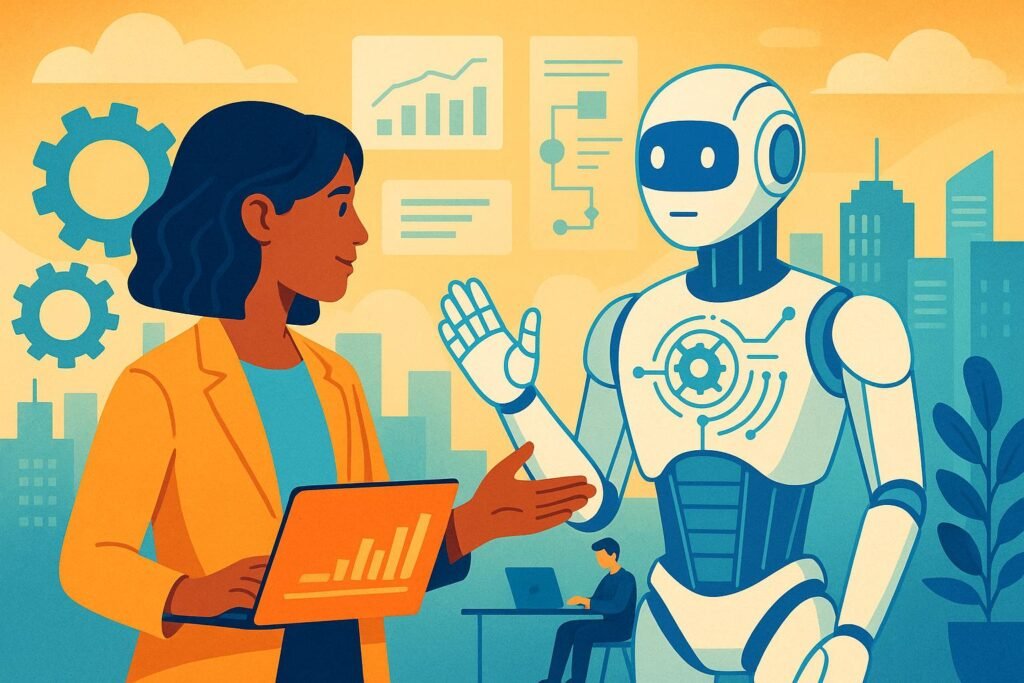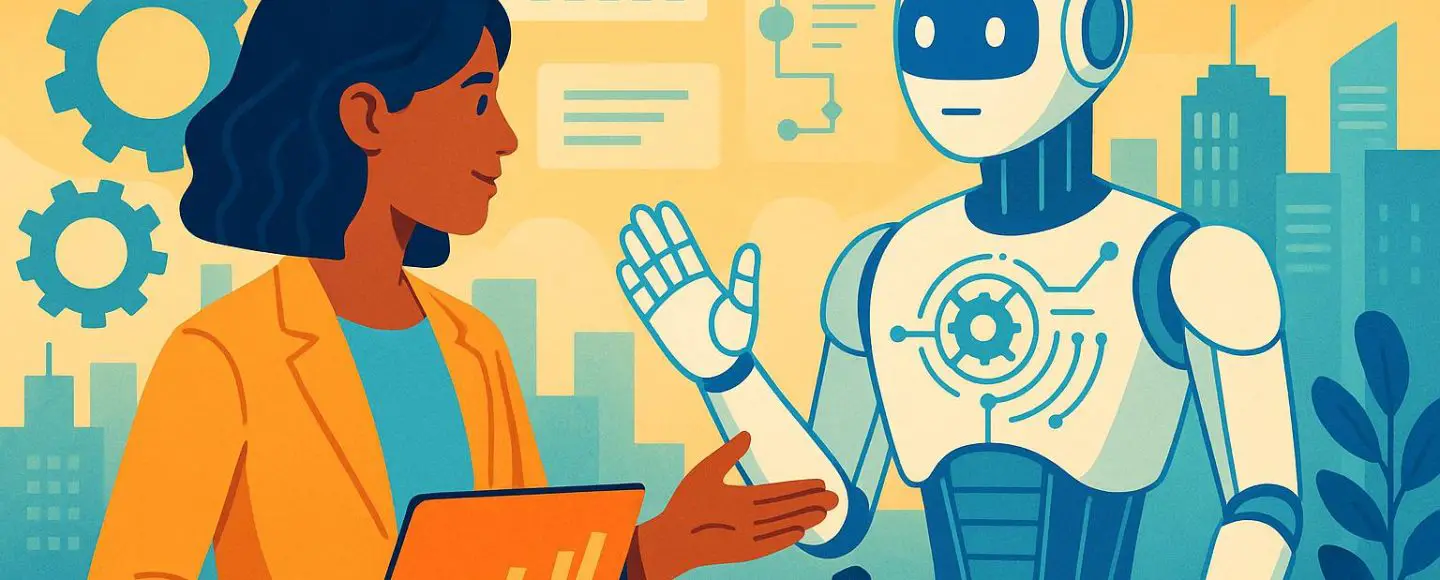

AI’s Role in Shaping Future Work
AI’s Role in Shaping Future Work couldn’t be more relevant in this era of technological transformation. Artificial intelligence is revolutionizing not just how we work but what work even means. From automating repetitive tasks to creating entirely new job categories, the AI-driven shift is changing employment landscapes across industries. Whether you’re planning a career, forming policy, or guiding workforce development, understanding AI’s employment impact is no longer optional. This article explores evidence, expert insights, and emerging career paths that highlight how AI is not simply replacing jobs but reshaping the future of work itself. For a broader overview, explore AI and the future of work on a global scale.
Key Takeaways
- AI is actively creating new jobs, particularly in roles related to human-AI collaboration, ethics, and data handling.
- Projections indicate significant job growth in AI-related fields, with global demand rising for roles like prompt engineers and AI trainers.
- Balancing job displacement with upskilling and education reform is critical to ensuring inclusive workforce transitions.
- Policymakers, educators, and tech leaders must work together to support emerging AI career paths and mitigate inequality risks.
Understanding the Shift: From Job Loss to Job Creation
Discussion around artificial intelligence and employment often centers on job loss and automation. A 2023 McKinsey report estimated that by 2030, up to 30 percent of the hours worked in the U.S. economy could be automated. Still, what is often overlooked is the surge in new job roles generated by AI innovation. Many of these jobs support, interpret, govern, or complement AI systems and are not limited to technical expertise.
Roles in AI ethics, human-centered AI design, and machine learning operations have seen a hiring increase of more than 25 percent in the past year, according to BLS and LinkedIn data from Q1 2024. This points to a strategic reallocation of labor. Rather than eliminating jobs, AI is transforming the employment landscape. For more examples, see real stories of human-machine collaboration.
Emerging Careers Created by AI
While certain traditional jobs are becoming automated, many roles have recently emerged that support the AI ecosystem across technical and human-centered domains. Below are a few such careers with live examples that show how AI is shaping new employment dynamics.
Prompt Engineer
A prompt engineer crafts effective input prompts to guide AI models into delivering accurate and relevant output. This job requires a mix of technical understanding and creative insight. Organizations like OpenAI and Anthropic hire specialists for this role with salaries often exceeding $150,000 due to their contribution to AI reliability and performance.
Case Example: Emily Sharpe, once a humanities major in linguistics, transitioned into prompt engineering through a six-month NLP bootcamp. She now works at a SaaS startup and refines chatbot interactions for customer service applications.
AI Ethicist
AI ethicists focus on the fairness, accountability, and transparency of AI systems. As governing bodies begin to regulate artificial intelligence, this role has gained visibility. Government agencies and large corporations are actively recruiting ethicists to support risk assessments and ensure responsible AI deployment.
Case Example: Nandeep Mehra, a philosophy doctorate from New Delhi, evaluates the ethical design of AI tools for refugee support. He works with an international consultancy involved in UN programs.
Data Labeler and Model Trainer
Though often undervalued, data labelers are vital to AI development workflows. These workers tag and organize information so machine learning systems can learn more effectively. Their role is especially prominent in emerging markets where companies are investing in workforce training and career growth pathways.
Case Example: Lilian Wanjiku in Nairobi leads annotation projects for a U.S.-based autonomous vehicle company. Her team’s accuracy ensures safe machine vision calibration, and she receives competitive compensation and benefits.
Where AI-Fueled Job Growth Is Happening
Based on data between 2022 and Q1 2024, several industries show strong AI-related job creation. These new roles embed artificial intelligence into sector-specific processes and drive demand for hybrid skills that combine digital intuition with domain expertise.
| Industry | Role Example | 2024 Projected Growth Rate |
|---|---|---|
| Healthcare | AI Clinical Model Auditor | 32% |
| Finance | Risk Modeling Specialist | 29% |
| Education & Training | AI Curriculum Designer | 27% |
| Retail & Logistics | Predictive Demand Analyst | 24% |
| Legal & Compliance | AI Compliance Analyst | 22% |
This data suggests the expansion of AI-related roles beyond traditional tech sectors. As analyzed on aiplusinfo.com, AI is changing the nature of modern workspaces and altering skill demands across disciplines.
Expert Opinions: What Labor Economists and Policy Experts Are Saying
Leading economists highlight the importance of proactive planning. The future distribution of AI-related jobs will reflect the quality of today’s educational investments and workforce policies.
Dr. David Autor of MIT believes the middle of the labor market could stabilize in sectors like healthcare and education. He encourages shifting policy discussion from fear of automation to reimagining worker training and pay equity models.
Adele Thomas, a senior technology advisor at the OECD, suggests that countries capable of rapidly retraining their population will benefit most. Delays in adapting skills to the AI economy will deepen inequalities.
Growing interest in wage subsidies, algorithmic audit requirements, and skilling tax credits reflects an emerging consensus that legislative flexibility and inclusive planning are key to handling the employment transition effectively.
Global Perspectives: Beyond the U.S. and Europe
Outside North America and Europe, AI is also fueling job creation. Remote annotation, tagging, and support services are booming in countries like the Philippines, India, and Kenya. Governments partnering with tech companies now run training centers where citizens can access global work opportunities inside the AI pipeline.
This kind of distributed labor model increases income opportunities in underserved communities. It also raises key challenges with fair pay and job stability. Ethical outsourcing practices and transparent value chains are essential to help AI-powered jobs in developing markets become sustainable. To explore more, see how automation is impacting global job systems.
Preparing for an AI-Shaped Labor Market
Understanding how AI shifts job qualifications is essential to adapting. Technical versatility is necessary, but employers are also emphasizing creative thinking, teamwork, and ethical sensitivity.
Three focus areas have emerged for preparing the future workforce:
- Curriculum Updates: Education systems must embed AI training into both STEM and liberal arts courses.
- Lifelong Learning Incentives: Adults seeking career transitions into AI roles should have access to publicly supported training programs.
- Ethical Awareness: Workers engaging with AI systems will need baseline understanding of bias, data security, and social impact.
These transformations are prompting higher education and corporate training departments to revisit outdated models. Governments are responding with grants and training tax credits aimed at smoothing transitions and reducing barriers to entry into AI-focused roles. Read about how AI is also transforming job hunting across industries.
Frequently Asked Questions
What jobs will be created because of AI?
Emerging roles include prompt engineers, AI ethicists, data labelers, algorithm auditors, and AI curriculum developers. These span both technical and non-technical areas.
What skills are needed to work in AI-related fields?
Key skills include machine learning, data analysis, natural language processing, software engineering, and cloud computing. Soft skills like critical thinking, ethics, and collaboration are increasingly important in roles that involve AI governance or policy.
Do I need a computer science degree to work in AI?
Not always. While technical roles often require formal education, many non-technical positions—such as AI policy analyst, product manager, or instructional designer—welcome backgrounds in humanities, business, or social sciences with appropriate training.
How can I transition into an AI-related role?
Start by taking online courses in AI fundamentals, build a portfolio of projects, and follow developments in the field. Bootcamps, certifications, and interdisciplinary programs also help professionals pivot into AI from adjacent industries.
Will AI replace more jobs than it creates?
AI will disrupt some jobs, but it is also expected to create new roles focused on oversight, support, development, and training of AI systems. The net impact depends on industry, education, and policy responses.
What industries will hire the most AI-related talent?
Healthcare, finance, manufacturing, education, marketing, and logistics are major sectors adopting AI. Each has growing demand for engineers, analysts, AI trainers, and hybrid roles that combine domain knowledge with AI fluency.
What is a prompt engineer?
A prompt engineer crafts and refines inputs for generative AI systems to produce useful and accurate outputs. This role blends technical understanding with creativity and problem-solving.
What does an AI ethicist do?
An AI ethicist ensures that AI systems align with ethical principles such as fairness, transparency, and accountability. They help companies navigate social and regulatory implications of AI deployment.
Can creatives find careers in AI?
Yes. Writers, artists, musicians, and designers are increasingly collaborating with AI tools. Roles include generative content curators, AI UX designers, and specialists in human-computer interaction.
Conclusion
AI is reshaping the future of work by redefining roles, streamlining tasks, and creating entirely new career paths. While some jobs will be displaced, many more will evolve or emerge, blending human judgment with machine intelligence. Success in this new landscape will depend on adaptability, continuous learning, and ethical integration. As industries transform, the focus must remain on building an inclusive workforce where AI enhances human potential rather than replaces it.
References
Brynjolfsson, Erik, and Andrew McAfee. The Second Machine Age: Work, Progress, and Prosperity in a Time of Brilliant Technologies. W. W. Norton & Company, 2016.
Marcus, Gary, and Ernest Davis. Rebooting AI: Building Artificial Intelligence We Can Trust. Vintage, 2019.
Russell, Stuart. Human Compatible: Artificial Intelligence and the Problem of Control. Viking, 2019.
Webb, Amy. The Big Nine: How the Tech Titans and Their Thinking Machines Could Warp Humanity. PublicAffairs, 2019.
Crevier, Daniel. AI: The Tumultuous History of the Search for Artificial Intelligence. Basic Books, 1993.




